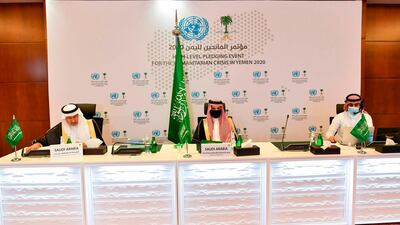Saudi Arabia is concerned that obstruction of aid operations conducted by Yemen's Houthi rebels will hamper future pledges made to alleviate the suffering of millions in the war-torn country, a top official has told The National.
The kingdom co-hosted the first ever virtual donor conference to shore up financial support for Yemen with the United Nations on Tuesday as it faces the coronavirus pandemic.
But it fell short of the $2.4 billion it said was necessary to pull Yemen back from the brink of disaster.
Pledges have dwindled after the majority of the donor states expressed fears that the Iran-backed Houthi rebels were interfering with aid distributed in areas under their control, intimidating humanitarian staff and were threatening to tax international assistance.
"My worry as a humanitarian is that when there is a concern from UN agencies and governments which are donors - if [Houthi acts] continue - it will hamper the generosity of donor countries, and we hope that won't reflect on the Yemeni people,"Abdullah Al Rabeeah, Supervisor General of King Salman Humanitarian Aid and Relief Centre (Ksrelief) and Adviser to the Royal Court, told The National.
“Saudi Arabia wants to see the aid distributed to all areas of Yemen irrespective of who controls them,” he said.
Humanitarian groups assist more than 10 million Yemenis every month but without additional funds, life-saving programmes will be forced to reduce or close.
The UN warned that more than 30 out of 41 major UN programmes in Yemen could close in the next few weeks, if full funds are not raised.
Mr Al Rabeeah said the kingdom will "negotiate with other countries to ensure funds will continue until the end of the year. You don't just stop at the conference."
For months, aid agencies have threatened to scale back projects in Houthi-controlled areas and have complained of worsening operations.
The Saudi official said those who participated in the conference were vocal about the obstacles presented by the Houthis.
“This hasn’t happened in the past, so this is a positive step,” he said.
The kingdom will continue to encourage countries to hold a firm stance on rebel violations.
“We hope that the international humanitarian community will coordinate and be fair in its stance against any violations and aggression towards humanitarian workers and aid distribution,” he said.
Pressure on the rebel group “should be vocal, fair and in the media, we should not have any tolerance towards violations against the needs and basic rights of women, children and the people of Yemen, irrespective of where they live,” he said.
UN agencies say 80 per cent of the population, or 24 million people, rely on aid to survive. And Yemen's battered healthcare system is struggling to cope with the outbreak of coronavirus on top of diseases such as cholera.
The UN and the international community must take a firm stance against violations committed by the rebels “because they are only harming the Yemenis themselves,” he said.
“We should increase the capacity of monitoring, we should also increase the work of credible organisations that will ensure that deliveries are made to all areas in the country,” he said.
Mr Al Rabeeah said the international community must also encourage local humanitarian agencies who operate on the ground to ensure that aid is delivered to civilians in Houthi controlled areas.
“There are many credible organisations which are Yemeni and have their ways to reach people on the ground and know their routes around the mountains, so we should encourage them,” he said.
Mr Al Rabeeah said the kingdom aimed to host the conference to ensure that political parties can come to a long lasting solution to ending the war in Yemen.
“This is the best way to move forward for the stability of Yemen,” he said.
Mr Al Rabeeah said the conference went well in terms of the number of attendees and high-level speakers.
Saudi Arabia has been the largest consistent donor to Yemen. The total of its funding to date is $16.9 billion.
The kingdom pledged $500 million (Dh1.83bn) to boost Yemen’s humanitarian response plan (HRP) during the conference.
“Three hundred million will go through the UN system according to the HRP, the remaining money will go to international organisations such as the International Committee of the Red Cross and others leading agencies who have a presence in Yemen,” Mr Al Rabeeah said.


